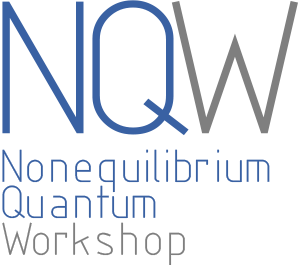Chair: Lev Vidmar
Marcin Mierzejewski: Phenomenology of spectral functions in disordered spin chains
Studies of disordered spin chains have recently experienced a renewed interest, inspired by the question to which extent the exact numerical calculations comply with the existence of a many-body localization phase transition. For the paradigmatic random field Heisenberg spin chains, many intriguing features were observed when the disorder is considerable compared to the spin interaction strength. Here, we introduce a phenomenological theory that may explain some of those features. The theory ...
Jacek Herbrych: Relaxation at different length-scales in models of many-body localization
We study dynamical correlation functions in the random-field Heisenberg chain, which probe the relaxation times at different length scales. Firstly, we show that the relaxation time associated with the dynamical imbalance (examining the relaxation at the smallest length scale) decreases with disorder much faster than the one determined by the dc conductivity (probing the global response of the system). We argue that the observed dependence of relaxation on the length scale originates from loc...
Laurenz Rettig: Coherent Modulation of Quasiparticle Scattering Rates in a Photoexcited Charge-Density-Wave System
Fundamental quasiparticle interactions in solids such as electron-electron and electron-phonon scattering are of fundamental importance e.g. for electronic and optical material properties. While for simple systems such as quasi-free electron gases, fairly good descriptions have been reached, for more complex solids, it remains highly challenging to unravel their intricate interplay, and to identify the dominant channels. Additional challenges arise from broken-symmetry ground states emerging...
Dinner
Chair: Jacek Herbrych
Anze Mraz: Nanocryotron-driven Charge Configuration Memory devices
For some time, cryo-computing has been severely limited by the absence of a suitable fast and energy efficient low-temperature memory making it an ideal platform for energy efficient memories. Conventional superconducting memories use an architecture based on Josephson junctions (JJs. Ideally, such memory should be compatible with single-flux quantum (SFQ) logic in terms of speed, switching energy and matching impedance. Here we present an implementation of non-volatile charge configuration m...
Robin Steinigeweg: Nontrivial damping of quantum many-body dynamics
Understanding how the dynamics of a given quantum system with many degrees of freedom is altered by the presence of a generic perturbation is a notoriously difficult question. Recent works predict that, in the overwhelming majority of cases, the unperturbed dynamics is just damped by a simple function, e.g., exponentially as expected from Fermi's Golden Rule. While these predictions rely on random-matrix arguments and typicality, they can only be verified for a specific physical situation by ...
Miroslav Hopjan: Detecting delocalization-localization transitions from full density distributions
Characterizing the delocalization transition in closed quantum systems with a many-body localized phase is a key open question in the field of nonequilibrium physics. We exploit the fact that localization of particles as realized in Anderson localization and standard many-body localization (MBL) implies Fock-space localization in single-particle basis sets characterized by a real-space index. Using a recently introduced quantitative measure for Fock-space localizationcomputed from the density...


